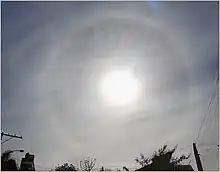halo
English



.jpg.webp)

Etymology
From Latin halōs, from Ancient Greek ἅλως (hálōs, “threshing floor; disk; disk of the sun or moon; ring of light around the sun or moon”), of unknown origin. The threshing floor's circular threshold or oxen walking on it in a circle gave rise to the other meanings. Used in English since 1563; the sense of light around someone’s head since 1646.
Pronunciation
Noun
- A circular band of coloured light, visible around the sun or moon etc., caused by reflection and refraction of light by ice crystals in the atmosphere.
- (astronomy) A cloud of gas and other matter surrounding and captured by the gravitational field of a large diffuse astronomical object, such as a galaxy or cluster of galaxies.
- Anything resembling this band, such as an effect caused by imperfect developing of photographs.
- (religion) nimbus, a luminous disc, often of gold, around or over the heads of saints, etc., in religious paintings.
- The metaphorical aura of glory, veneration or sentiment which surrounds an idealized entity.
- her halo slipped
- 1829, Edgar Allan Poe, “Tamerlane”, in Al Aaraaf, Tamerlane and Minor Poems:
- O! yearning heart! I did inherit
Thy withering portion with the fame,
The searing glory which hath shone
Amid the jewels of my throne,
Halo of Hell!
- (advertising) The bias caused by the halo effect.
- 2016, National Academies of Sciences, Engineering, and Medicine, Health and Medicine Division, Food and Nutrition Board, Food Literacy: How Do Communications and Marketing Impact Consumer Knowledge, Skills, and Behavior?, page 51:
- In both cases, they found that […] there was a halo effect (e.g., when a "low cholesterol" claim was made, consumers perceived other nutrients, such as fat, also to be at low levels when they were actually high). Andrews reported that these misleading halos were reduced only when the claims were accompanied by an evaluative disclosure […]
- (art, religion, iconography) a circular annulus ring, frequently luminous, often golden, floating above the head
- (medicine) A circular brace used to keep the head and neck in position.
- (motor racing) A rollbar placed in front of the driver, used to protect the cockpit of an open cockpit racecar.
- (automotive) Short for halo headlight.
Derived terms
- euel's halo sign
- galactic halo
- halo blight
- halo brim
- halo car
- halo effect
- halo hat
- halo nucleus
- halo orbit
- halo sign
- massive and compact halo object
- massive astronomical compact halo object
- massive astrophysical compact halo object
- massive compact halo object
- near-rectilinear halo orbit
- neutron halo
- nuclear halo
- pleochroic halo
- proton halo
- radio halo
- sprite halo
Translations
|
|
Verb
halo (third-person singular simple present haloes, present participle haloing, simple past and past participle haloed)
Related terms
Translations
References
- Webster's Seventh New Collegiate Dictionary, Springfield, Massachusetts, G.&C. Merriam Co., 1967
- Douglas Harper (2001–2024) “halo”, in Online Etymology Dictionary.
Anagrams
Bikol Central
Alternative forms
Pronunciation
- Hyphenation: ha‧lo
- IPA(key): /ˈhalo/, [ˈha.l̪o]
Etymology 2
Inherited from Proto-Malayo-Polynesian *qahəlu, from Proto-Austronesian *qaSəlu.
Pronunciation
- Hyphenation: ha‧lo
- IPA(key): /ˈhaʔlo/, [ˈhaʔ.l̪o]
See also
- labok
- lubang
Derived terms
- haluon
- ihalo
- maghalo
Breton
Etymology
From Proto-Celtic *salā (“filth, dirt”).
References
- Matasović, Ranko (2009) Etymological Dictionary of Proto-Celtic (Leiden Indo-European Etymological Dictionary Series; 9), Leiden: Brill, →ISBN, page 319
- Revue celtique. (1888). France: F. Vieweg., p 374
Catalan
Cebuano
Alternative forms
Etymology
For the second noun sense, the monitor lizard's timidity likened to cowardice.
Pronunciation
- Hyphenation: ha‧lo
Anagrams
Czech
Pronunciation
- IPA(key): [ˈɦalo]
- Hyphenation: ha‧lo
Declension
Danish
Etymology
Medieval Latin, from Latin halos, from Ancient Greek ἅλως (hálōs, “disk of the sun or moon”).
Dutch
Etymology
From Latin halos, from Ancient Greek ἅλως (hálōs, “disk of the sun or moon, ring of light around the sun or moon; threshing floor; disk of a shield”), itself of unknown origin.
Pronunciation
- IPA(key): /ˈɦaː.loː/
Audio (file)
Noun
halo m (plural halo's, diminutive halootje n)
- halo (atmospheric phenomenon).
- Similar visual effect resulting from undesirable, roughly circular spots on an imperfectly developed photograph.
References
- M. J. Koenen & J. Endepols, Verklarend Handwoordenboek der Nederlandse Taal (tevens Vreemde-woordentolk), Groningen, Wolters-Noordhoff, 1969 (26th edition) [Dutch dictionary in Dutch]
Anagrams
Esperanto
Pronunciation
- IPA(key): [ˈhalo]
- Audio:
(file) - Rhymes: -alo
- Hyphenation: ha‧lo
Etymology 1
Of Germanic origin; related to German Halle, Dutch hal, also to Norwegian hall and Swedish hall.
Usage notes
To avoid confusion with the above halo, the authors of the Plena Ilustrita Vortaro de Esperanto recommend including the particle lo or adding a space ("ha lo").
Finnish
Pronunciation
- IPA(key): /ˈhɑlo/, [ˈhɑ̝lo̞]
- Rhymes: -ɑlo
- Syllabification(key): ha‧lo
Verb
halo
- inflection of halkoa:
- present active indicative connegative
- second-person singular present imperative
- second-person singular present active imperative connegative
Declension
| Inflection of halo (Kotus type 1/valo, no gradation) | ||||
|---|---|---|---|---|
| nominative | halo | halot | ||
| genitive | halon | halojen | ||
| partitive | haloa | haloja | ||
| illative | haloon | haloihin | ||
| singular | plural | |||
| nominative | halo | halot | ||
| accusative | nom. | halo | halot | |
| gen. | halon | |||
| genitive | halon | halojen | ||
| partitive | haloa | haloja | ||
| inessive | halossa | haloissa | ||
| elative | halosta | haloista | ||
| illative | haloon | haloihin | ||
| adessive | halolla | haloilla | ||
| ablative | halolta | haloilta | ||
| allative | halolle | haloille | ||
| essive | halona | haloina | ||
| translative | haloksi | haloiksi | ||
| abessive | halotta | haloitta | ||
| instructive | — | haloin | ||
| comitative | See the possessive forms below. | |||
| Possessive forms of halo (Kotus type 1/valo, no gradation) | ||||||||||||||||||||||||||||||||||||||||||||||||||||||||||||||||||||||||||||||||||||||||||||||||||||||||||||||||||||||||||||||||||||||||||||||||||||||||||||||||||||||||||||||||||||||||||||||||||||||||||||||||||||||||||||||||||||||||||||||||||||||||||||||||||||||||||||||||||||||||||||||||||||||||||||||||||||||||||||||||||||||||||||||||||||||||||||||
|---|---|---|---|---|---|---|---|---|---|---|---|---|---|---|---|---|---|---|---|---|---|---|---|---|---|---|---|---|---|---|---|---|---|---|---|---|---|---|---|---|---|---|---|---|---|---|---|---|---|---|---|---|---|---|---|---|---|---|---|---|---|---|---|---|---|---|---|---|---|---|---|---|---|---|---|---|---|---|---|---|---|---|---|---|---|---|---|---|---|---|---|---|---|---|---|---|---|---|---|---|---|---|---|---|---|---|---|---|---|---|---|---|---|---|---|---|---|---|---|---|---|---|---|---|---|---|---|---|---|---|---|---|---|---|---|---|---|---|---|---|---|---|---|---|---|---|---|---|---|---|---|---|---|---|---|---|---|---|---|---|---|---|---|---|---|---|---|---|---|---|---|---|---|---|---|---|---|---|---|---|---|---|---|---|---|---|---|---|---|---|---|---|---|---|---|---|---|---|---|---|---|---|---|---|---|---|---|---|---|---|---|---|---|---|---|---|---|---|---|---|---|---|---|---|---|---|---|---|---|---|---|---|---|---|---|---|---|---|---|---|---|---|---|---|---|---|---|---|---|---|---|---|---|---|---|---|---|---|---|---|---|---|---|---|---|---|---|---|---|---|---|---|---|---|---|---|---|---|---|---|---|---|---|---|---|---|---|---|---|---|---|---|---|---|---|---|---|---|---|---|---|---|---|---|---|---|---|---|---|---|---|---|---|---|---|---|---|---|---|---|---|---|---|---|---|---|---|---|---|---|---|---|---|---|---|---|---|---|---|---|---|---|---|---|---|---|---|---|---|---|
| ||||||||||||||||||||||||||||||||||||||||||||||||||||||||||||||||||||||||||||||||||||||||||||||||||||||||||||||||||||||||||||||||||||||||||||||||||||||||||||||||||||||||||||||||||||||||||||||||||||||||||||||||||||||||||||||||||||||||||||||||||||||||||||||||||||||||||||||||||||||||||||||||||||||||||||||||||||||||||||||||||||||||||||||||||||||||||||||
Derived terms
Further reading
- “halo”, in Kielitoimiston sanakirja [Dictionary of Contemporary Finnish] (in Finnish) (online dictionary, continuously updated), Kotimaisten kielten keskuksen verkkojulkaisuja 35, Helsinki: Kotimaisten kielten tutkimuskeskus (Institute for the Languages of Finland), 2004–, retrieved 2023-07-01
French
Etymology
From Latin halos, from Ancient Greek ἅλως (hálōs, “disk of the sun or moon, ring of light around the sun or moon; threshing floor; disk of a shield”), itself of unknown origin.
Pronunciation
- (aspirated h) IPA(key): /a.lo/
audio (file)
Noun
halo m (plural halos)
- Halo (atmospheric phenomenon)
- Similar visual effect resulting from undesirable, roughly circular spots on an imperfectly developed photograph
References
- Nouveau Petit Larousse illustré. Dictionnaire encyclopédique. Paris, Librairie Larousse, 1952, 146th edition
Further reading
- “halo”, in Trésor de la langue française informatisé [Digitized Treasury of the French Language], 2012.
Galician
Latin
Etymology
Possibly a denominal of Proto-Indo-European *h₂enh₁-slo- (“a breathing”, whence Latin anhēlus), from the root *h₂enh₁- (“to breathe”). The syncope of the second syllable is expected, while the /h-/ is unetymologycal and likely onomatopoeic.[1][2] Ultimately akin to animus (“spirit”).
Pronunciation
- (Classical) IPA(key): /ˈhaː.loː/, [ˈhäːɫ̪oː]
- (modern Italianate Ecclesiastical) IPA(key): /ˈa.lo/, [ˈäːlo]
Verb
hālō (present infinitive hālāre, perfect active hālāvī, supine hālātum); first conjugation
- to breathe
- to emit, exhale, release (gas or fragrance)
- to be fragrant
- 29 BCE – 19 BCE, Virgil, Aeneid 1.416–418:
- Ipsa Paphum sublimis abit sedesque revisit
Laeta suas ubi templum illi centumque Sabaeo
Ture calent arae sertisque recentibus halant.- [Venus] goes flying back to Paphos and sees happily again her seat
Where there is a temple to her and a hundred altars
That warmly glow with Sheban incense and are perfumed by fresh wreaths.
- [Venus] goes flying back to Paphos and sees happily again her seat
- Ipsa Paphum sublimis abit sedesque revisit
Conjugation
Synonyms
References
- “halo”, in Charlton T. Lewis and Charles Short (1879) A Latin Dictionary, Oxford: Clarendon Press
- “halo”, in Charlton T. Lewis (1891) An Elementary Latin Dictionary, New York: Harper & Brothers
- halo in Gaffiot, Félix (1934) Dictionnaire illustré latin-français, Hachette.
- De Vaan, Michiel (2008) “hālō, -āre”, in Etymological Dictionary of Latin and the other Italic Languages (Leiden Indo-European Etymological Dictionary Series; 7), Leiden, Boston: Brill, →ISBN, page 279
- Pokorny, Julius (1959) Indogermanisches etymologisches Wörterbuch [Indo-European Etymological Dictionary] (in German), Bern, München: Francke Verlag
Norwegian Bokmål
Norwegian Nynorsk
Polish
Pronunciation
- IPA(key): /ˈxa.lɔ/
Audio 1 (file) Audio 2 (file) - Rhymes: -alɔ
- Syllabification: ha‧lo
Etymology 1
Internationalism; compare English halo, French halo, German Halo, ultimately from Latin halōs, from Ancient Greek ἅλως (hálōs).
Noun
halo n (indeclinable)
- halo (circular band of coloured light, visible around the sun or moon, etc., caused by reflection and refraction of light by ice crystals in the atmosphere)
- (astronomy) halo (cloud of gas and other matter surrounding and captured by the gravitational field of a large diffuse astronomical object, such as a galaxy or cluster of galaxies)
- (photography) halo (luminous border in a photograph around shiny or reflective objects)
- (literary) halo (metaphorical aura of glory, veneration, or sentiment which surrounds an idealized entity)
Etymology 2
Borrowed from American English hallo.
Alternative forms
Interjection
halo
Etymology 3
See the etymology of the corresponding lemma form.
Portuguese
Etymology
Learned borrowing from Latin halos, from Ancient Greek ἅλως (hálōs, “disk of the sun or moon”).[1][2]
Noun
halo m (plural halos)
References
- “halo” in Dicionário infopédia da Língua Portuguesa. Porto: Porto Editora, 2003–2024.
- “halo” in Dicionário Priberam da Língua Portuguesa.
Romanian
Serbo-Croatian
Spanish
Etymology 1
Borrowed from Medieval Latin, from Latin halos, from Ancient Greek ἅλως (hálōs, “disk of the sun or moon”).
Noun
halo m (plural halos)
Further reading
- “halo”, in Diccionario de la lengua española, Vigésima tercera edición, Real Academia Española, 2014
Anagrams
Swedish
Etymology
Medieval Latin, from Latin halos, from Ancient Greek ἅλως (hálōs, “disk of the sun or moon”). Related to English and Danish halo.
Tagalog
Etymology 1
Compare Bikol Central halo (“mixture”), Cebuano halo (“mingle”), Malay haru (“stir; chaos”), and Malay arau (“stirring”).
Pronunciation
- (Standard Tagalog)
- IPA(key): /ˈhaloʔ/ [ˈha.loʔ] (noun)
- Rhymes: -aloʔ
- IPA(key): /haˈloʔ/ [hɐˈloʔ] (adjective)
- Rhymes: -oʔ
- IPA(key): /ˈhaloʔ/ [ˈha.loʔ] (noun)
- Syllabification: ha‧lo
Noun
halò (Baybayin spelling ᜑᜎᜓ)
Derived terms
- halo-halo
- haluan
- haluin
- halungtiyang
- ihalo
- kahalo
- maghalo
- maghalo ang balat sa tinalupan
- magkahalo
- makihalo
- mapahalo
- paghalo
- paghaluin
- pagkakahalo
- panghalo
See also
Etymology 2
Inherited from Proto-Malayo-Polynesian *qahəlu, from Proto-Austronesian *qaSəlu.
Pronunciation
- (Standard Tagalog) IPA(key): /ˈhalo/ [ˈha.lo]
- Rhymes: -alo
- Syllabification: ha‧lo
See also
- mortero
- pambayo
Pronunciation
- (Standard Tagalog) IPA(key): /haˈlo/ [hɐˈlo]
- Rhymes: -o
- Syllabification: ha‧lo
Alternative forms
Further reading
- “halo”, in Pambansang Diksiyonaryo | Diksiyonaryo.ph, Manila, 2018